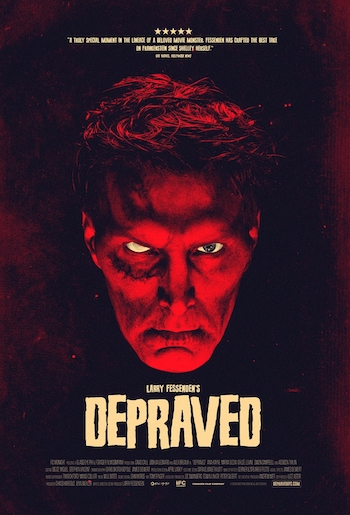
[Rating: Solid Rock Fist Up]
“The legend of Frankenstein gets a provocative modern update in the stylishly disturbing new film from indie horror master Larry Fessenden. Suffering from PTSD following his stint as an army medic, Henry (David Call) now works feverishly in his Brooklyn laboratory to forget the death he witnessed overseas by creating life in the form of a man cobbled together from body parts. After procuring a brain from an unwitting victim, his creation—Adam (Alex Breaux)—is born. But it soon seems that giving
life to Adam was the easy part; teaching him how to live in a dark and troubled world may be perilous. A complex, emotionally shattering tale about what it means to be human, Depraved brings Mary Shelley’s immortal fable fully into the 21st century.”
Even if the summary from IFC Midnight didn’t make the connection absurdly clear, the new film from director and producer Larry Fessenden, Depraved (at the Screenland Crossroads in Kansas City this weekend), would be readily apparent to anyone with the slightest sense of cinematic or literary history.
It’s that literary history, more than anything, which really propels Depraved, and it’s so much for the better. So many adaptations or riffs on the subject go immediately for the jugular, adapting James Whale’s series of films for Universal in the 1930s, while ignoring Mary Shelley’s original work. While just a bit late for last year’s bicentennial celebrations of The Modern Prometheus, Fessenden’s film – from his own script – is the most true to certain elements of Shelley’s story.
The humanity in Depraved is really allowed a lot of room to breathe, and for the first 20 minutes or so of the nearly two-hour film, we spend time with the newly-awakened Adam and his creator and keeper, Henry. Henry’s faults are established early on, when Adam scores a point on him during one of their many games of ping pong, and his “Fuck!” is far out of proportion to a minor loss. It’s important, because we get to have a sense of the character of Adam, rather than immediately shuffling him into our mental Frankenstein deck somewhere in between Boris Karloff and Christopher Lee, with a touch of Fred Gwynne.

Depraved could possibly be referred to as a post-modern Prometheus, a la The X-Files episode of the same – up to and including a character named Polidori who takes part in Adam’s creation – but the Frankenstein adaptation to which the film finds most similar ground is the Royal National Theatre production of the stage play from 2011. The Danny Boyle-directed and Benedict Cumberbatch and Jonny Lee Miller-starring play was a minimal production, with much of the stage left bare, and much of the production value provided by 3500 lights which flickered and pulsed in response to the events taking place.
Much in the same way, Fessenden relies on screen overlays, which perform much the same task, as if we’re seeing the connections rewiring themselves within Adam’s brain, as it becomes used to the new patchwork body in which it finds itself. Similarly, and going back to that “Fuck!” during the game of ping pong, Depraved is also told from the perspective of Adam (aka “the Monster”), rather than that of Henry (Frankenstein – literally, in that we learn that his full name is actually “Henry Frankenstein” at one point).
There’s a sense of Henry’s story, here and there, but ultimately, it’s Adam’s which is the most interesting one. It takes a while to tell, and the repeated process of him discovering new things regarding people is slightly at cross purposes with the fact that we’re shown he has some vague memories of who he – or his brain – used to be, so Depraved starts to feel its runtime somewhere just past the halfway mark.
The back half of Depraved isn’t as intriguing as the first, with a finale which really leans a bit too much into 1950s horror comics by way of 1970s grindhouse pictures, but there’s a scene in a bar which updates the little-girl-and-the-pond scene from Whale’s 1931 Frankenstein so absolutely perfectly, I’m willing to forgive the fact that Addison Timlin‘s character is named Shelley. The scene has such a mix of real-world edge and cinematic innocence, the inevitable result was heartbreaking even as I saw it coming from a mile away. It’s handled so adeptly, with the actors nailing their roles expertly.
Less appealing is an allusion to “I will be with you on your wedding night” that’s utterly unnecessary and horrid, and I hated it as soon as it was apparent it was happening. It soured the ending, and only a return in Depraved‘s final moments to where it all began makes up for its inclusion.
All said, Larry Fessenden’s Depraved has its flaws, but the ways in which it succeeds are so marvelous and inventive, it’s worth looking past them to see a movie which manages to be fresh while treading very, very familiar ground.





Comments on this entry are closed.